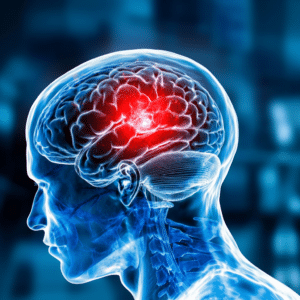Iatrogenic brain injury occurs when medical treatment inadvertently harms the brain. Common causes include surgical errors, medication reactions, and diagnostic mistakes. In this article, we’ll explore the definition, causes, symptoms, diagnosis, mental health impact, treatment, recovery, and prevention of iatrogenic brain injuries.
Key Takeaways
- Iatrogenic brain injuries are caused by medical interventions, not external trauma, and can arise from surgical errors, medication side effects, or diagnostic mishaps.
- Symptoms are diverse and can include headaches, cognitive impairments, and emotional disturbances, requiring accurate diagnosis through neuropsychological testing and imaging studies.
- Effective treatment involves a holistic approach that includes the ABCDE bundle for managing symptoms, multimodal rehabilitation strategies, and a coordinated effort from a multidisciplinary healthcare team.
Your search for help ends here. Let’s get started, for FREE.
Defining Iatrogenic Brain Injury
Iatrogenic brain injury is a type of brain damage that arises not from external trauma but from medical interventions themselves. This makes it distinct from other types of head injuries, such as those caused by accidents or sports.
Unlike other brain injuries, iatrogenic injuries are directly linked to the actions of healthcare providers. Whether due to surgical errors, medication side effects, or diagnostic mishaps, these injuries are a stark reminder of the delicate balance between medical treatment and patient safety.
Common Causes of Iatrogenic Brain Injury
 The causes of iatrogenic brain injury are as varied as the medical procedures themselves. From surgeries to medications and diagnostic tests, several factors can lead to unintended brain damage during medical treatment.
The causes of iatrogenic brain injury are as varied as the medical procedures themselves. From surgeries to medications and diagnostic tests, several factors can lead to unintended brain damage during medical treatment.
Surgical mistakes are one of the primary culprits. Operating on the wrong site or using malfunctioning medical equipment can result in severe brain damage. These errors, often referred to as accidents, are catastrophic, leading to significant and sometimes irreversible consequences.
Medications, too, play a significant role. Incorrect dosages or adverse reactions can contribute to brain injuries. Diagnostic errors, especially those that delay the timely and accurate identification of health issues, can also lead to significant brain injuries. Common examples include complications from anesthesia and infections following surgery.
These iatrogenic incidents highlight the importance of vigilance and precision in medical practice.
Symptoms and Diagnosis
Symptoms of iatrogenic head injury brain injury can be varied and challenging to pinpoint. Many patients report that the most severe symptoms occur within the first three days following the injury. These can include headaches, dizziness, and cognitive impairment.
Persistent post-concussive symptoms (PPCS), such as cognitive and emotional difficulties, can affect 10% to 15% of those with mild traumatic brain injury (MTBI). Psychological issues like depression, anxiety, and post-traumatic stress disorder (PTSD) are also common.
Diagnosis often involves neuropsychological tests to identify cognitive deficits and guide treatment plans. Imaging studies like MRI and CT scans are used to rule out structural brain damage. However, biases in self-reporting symptoms can complicate the diagnosis, with individuals either exaggerating or downplaying their symptoms based on various pressures.
The presence of pre-existing mental health conditions can also influence the likelihood of developing psychological distress after a brain injury. This makes early and accurate diagnosis crucial for effective treatment and management.
Suffered a Brain Injury?
Impact on Mental Health
The impact of iatrogenic brain injuries on mental health can be profound and long-lasting. These injuries can lead to long-term neurological issues, significantly affecting a patient’s recovery and quality of life.
Following a mild traumatic brain injury, patients often experience cognitive issues like poor concentration and memory problems, as well as emotional disturbances such as anxiety and irritability. The presence of psychological distress, including depression and anxiety, can exacerbate these symptoms.
Psychiatric disorders such as psychosis and PTSD can co-occur following stroke, complicating treatment approaches. Emotional lability, characterized by sudden and uncontrollable emotional outbursts, is also common among stroke survivors. Effective treatment often requires a combination of cognitive behavioral therapy (CBT) and medications tailored to the individual’s needs.
Treatment and Management
Treating iatrogenic brain injuries requires a comprehensive and multifaceted approach. Multimodal therapeutic strategies, including sensory stimulation and active engagement, are crucial for facilitating recovery in patients with disorders of consciousness.
One effective strategy is the ABCDE bundle, a multi-component article approach that promotes better patient outcomes by coordinating sedation management, breathing trials, and mobility efforts. This approach helps in managing the symptoms and improving the overall prognosis.
Neurostimulants such as amantadine and modafinil are commonly employed to support recovery in patients with iatrogenic brain injuries. These medications help enhance cognitive function and alertness, aiding in the rehabilitation process.
Integrating multimodal rehabilitation strategies with ongoing medical support is essential for optimizing full-text recovery outcomes. This holistic approach ensures that all aspects of the patient’s health are addressed, leading to better management and improved quality of life.
Recovery and Rehabilitation
 Recovery and rehabilitation from iatrogenic brain injuries demand early and proactive intervention. Early mobilization of patients, especially in the ICU, has been shown to decrease the risk of both cognitive and physical dysfunction. Factors such as prior sedative use and the duration of unresponsiveness can adversely affect the recovery trajectory and functional outcomes. This makes it crucial to implement timely and thorough rehabilitation plans to mitigate these risks.
Recovery and rehabilitation from iatrogenic brain injuries demand early and proactive intervention. Early mobilization of patients, especially in the ICU, has been shown to decrease the risk of both cognitive and physical dysfunction. Factors such as prior sedative use and the duration of unresponsiveness can adversely affect the recovery trajectory and functional outcomes. This makes it crucial to implement timely and thorough rehabilitation plans to mitigate these risks.
A comprehensive rehabilitation plan, including physical therapy, cognitive rehabilitation, and psychological support, is essential. These plans help patients regain their abilities and improve their quality of life.
Support from a multidisciplinary team, including physicians, nurses, and mental health professionals, is vital for a successful recovery.
Their coordinated efforts ensure that all aspects of the patient’s health are addressed, promoting better outcomes and a smoother process to recovery.
Case Studies and Research
Recent literature has highlighted several cases of iatrogenic cerebral amyloid angiopathy (iCAA) arising from neurosurgical procedures, suggesting a link to prion transmission. These case studies provide valuable insights into the risks associated with neurosurgical interventions.
One notable case involved a patient with a history of traumatic brain injury who developed intracerebral hemorrhage, leading to an iCAA diagnosis confirmed by imaging studies. Such cases underscore the need for careful monitoring and preventive strategies during neurosurgical procedures.
Ongoing research is critical to establishing protocols that minimize the risks associated with iatrogenic brain injuries. These studies aim to develop better monitoring techniques and preventive measures to ensure patient safety during medical interventions.
Preventing Iatrogenic Brain Injury
Preventing iatrogenic brain injury requires meticulous attention to detail and effective communication among healthcare staff. Communication failures can exacerbate risks, making it essential for healthcare providers to maintain clear and consistent communication.
Falls within healthcare settings are another risk factor, particularly for elderly patients. Implementing daily assessments to determine patient readiness for ventilator weaning can help minimize risks associated with mechanical ventilation.
Standardized delirium monitoring can identify at-risk patients early, enabling timely interventions and reducing the likelihood of brain injury. These preventive measures are crucial for enhancing patient safety and minimizing the incidence of iatrogenic brain injuries.
Frequently Asked Questions
What is an iatrogenic brain injury?
An iatrogenic brain injury refers to brain damage caused by medical interventions, highlighting the importance of carefully considering the potential risks of treatments. Understanding this type of injury is crucial for both patients and healthcare providers to ensure safer medical practices.
What are the common causes of iatrogenic brain injury?
Iatrogenic brain injury often results from surgical mistakes, medication errors, diagnostic inaccuracies, and complications arising from anesthesia. Addressing these issues can significantly reduce the risk of such injuries.
How are iatrogenic brain injuries diagnosed?
Iatrogenic brain injuries are diagnosed through neuropsychological assessments, MRI, and CT scans, which help identify cognitive deficits and exclude any structural brain damage. This comprehensive approach ensures the accurate detection of related complications.
What impact can iatrogenic brain injuries have on mental health?
Iatrogenic brain injuries can significantly impact mental health by causing long-term neurological issues and increasing the risk of psychological disorders such as depression and anxiety. Addressing these effects is crucial for better patient outcomes.
How can iatrogenic brain injuries be prevented?
Iatrogenic brain injuries can be prevented through effective communication among healthcare staff, implementing measures to prevent falls and standardized delirium monitoring. These strategies are essential for safeguarding patient safety.











